
During the in New Orleans, LA, two mobile workshops were organized to illustrate wealth creation concepts and how communities are keeping wealth local: the Lafitte Greenway and Tour of New Orleans’ Cooperative Businesses and History.
 Lafitte Greenway: Transformative Community Asset
Lafitte Greenway: Transformative Community Asset
The Lafitte Greenway is a transformative urban park in New Orleans, stretching 2.6 miles and serving as a vibrant corridor for recreation, community events, and sustainable development. The Greenway serves as a vibrant example of how local investments can spur wealth creation while serving as a catalyst for local economic growth and the promotion of community engagement and resilience. The Greenway was originally constructed as a canal that played a critical role in the city’s history, transportation, and development, it also later served as a railroad line before becoming the Greenway. Today, this city-owned space is home to the largest outdoor public fitness program in New Orleans, called GetFit the Greenway, run by Lafitte Greenway Partnership. GetFit the Greenway draws in around 1,600 visitors yearly for fitness offerings and hosts a bike path used by 1,000 daily, with usage quadrupling during large events like Mardi Gras and Jazzfest. The bike share program, available for just $5 a month, provides affordable transportation options, enhances mobility for residents, and connects them to the broader city landscape.
Alongside its recreational offerings, the Greenway promotes climate and environmental resilience with stormwater management features like a rainwater swale and over 500 native cypress trees planted since 2022. The Greenway also features a 5,000 square foot demonstration rain garden. Additionally, a community-based data-gathering project used innovative measures like infrared cameras to help monitor playground temperatures to inform residents about on-the-ground climate impacts.
The park also supports local economic growth, attracting $330 million in real estate investment since it was constructed in 2015, around 30% of which was the construction of 1,114 new permanently affordable housing units and public sector projects like the Greenway Station, a former brake-tag facility that has been converted into an events pavilion for local festivals, further strengthening connections among residents.
The Great Lawn offers a community gathering space as well as public art, including a mound sculpture called Nanih Bvlbancha, reminiscent of Poverty Point mounds, a UNESCO World Heritage site, which are an ancient, large-scale earthwork complex in northeastern Louisiana, built by indigenous peoples over 3,000 years ago.
Close to 10,000 people live within a five-minute walk of the Greenway, highlighting its importance as a central hub for cultural connection, climate resilience, and local economic empowerment, fostering a healthy, thriving community in New Orleans.
Current efforts to establish the Lafitte Greenway Economic Development District (EDD)1 and explore value capture mechanisms are aimed to ensure that the economic benefits of the Greenway remain within the community.
1 Louisiana uses the term EDDs for organizations that are more akin to local development organizations, not Economic Development Districts. Economic development districts in Louisiana are a proactive tool that communities can utilize to create or accelerate growth in a defined area within their corporate boundaries. The framework for economic development districts was created by state legislative mandate, but the legal ability to establish a district is afforded to either parish or local government. In some cases, these districts can be cooperative efforts between local and parish governments. https://www.opportunitystlandry.com/about/economic-development-districts
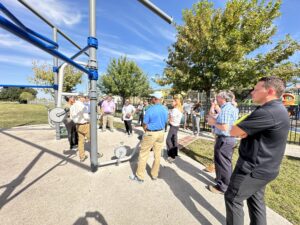
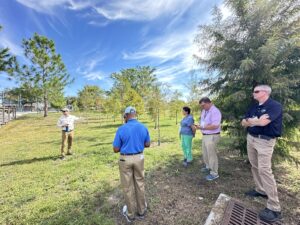
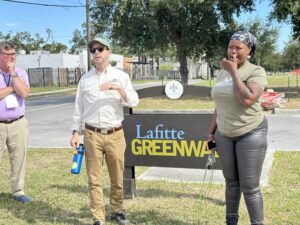
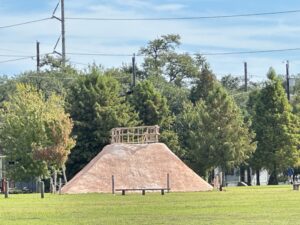






Cooperation New Orleans
Another mobile workshop offered during the 2024 Annual Training Conference included a discussion of mutual aid societies and how they evolved into the rich history of cooperatives in New Orleans, led by Cooperation New Orleans.
The history of mutual aid societies in New Orleans is deeply intertwined with the city’s cultural and social fabric, particularly among marginalized communities. Mutual aid societies in New Orleans emerged in the 19th century, primarily among free people of color and immigrant communities, as a response to systemic discrimination, economic hardship, and the lack of support from public institutions. The societies aimed to provide
members with essential services, including financial assistance for medical bills, funeral costs, and support during times of crisis, playing a crucial role in fostering community solidarity and resilience. In recent years, mutual aid societies have seen a resurgence, especially during crises like Hurricane Katrina and the COVID-19 pandemic, reemerging as grassroots organizations focused on community empowerment, while addressing social inequities. Overall, mutual aid societies in New Orleans reflect the city’s diverse history and the enduring spirit of cooperation and support among its communities.
The first stop was to Gentilly to one of the first nursing homes in the US and St. Mary’s Academy, run by the Sisters of the Holy Family, which was the first group of African American nuns. The tour moved through the cemetery area, where there is a history of mutual aid societies purchasing crypts for members.
The legacy of mutual aid societies and community cooperation is also evident in predominantly black neighborhoods like the Treme and Bayou Road. Bayou Road is the oldest street in New Orleans, originally traveled by Native Americans and then the French. Over time, Bayou Road became a place dominated by thriving black-owned businesses. The tour visited a variety of Bayou Road businesses, including the Pagoda Café, a worker-owned cooperative on Bayou Road, showcasing how cooperative business models can empower local entrepreneurs and foster economic resilience. The Pagoda Cafe was established in 2013 and then transitioned to worker ownership in 2022, with the help of Cooperation New Orleans.
Cooperation New Orleans is a dynamic initiative focused on empowering communities by supporting cooperative and worker-owned businesses, reducing financial barriers and fostering a culture of mutual aid and collective entrepreneurship. Formed with the vision of economic equity and community resilience, Cooperation New Orleans offers resources and technical assistance to cooperatives, especially in historically marginalized communities like Treme and Bayou Road. Through services including strategic planning, legal assistance, financial counseling, and access to non-extractive loans through SEED Commons, Cooperation New Orleans helps individuals and groups looking to start or grow their own enterprises overcome traditional barriers to business ownership, like lack of collateral or credit. Through workshops, community events, and resource mobilization, Cooperation New Orleans aims to establish a sustainable network of cooperative enterprises, ultimately keeping wealth and cultural capital within the community and paving the way for generational wealth and local empowerment.
Efforts like the SEED Commons initiative ensure that “no one who takes out a loan is left worse off,” providing a supportive framework for local entrepreneurs. As of 2024, Seed Commons is a network comprising 23 actively lending local funds. Seed Commons has made $88 million in non-extractive investments since 2011, across 396 loans, through 39 network member organizations around the US.
The last stop was another beneficiary of Cooperation New Orleans’ and Seed Commons’ assistance, the Beautiful Creole Apache and Keep it in the Culture Coop, a worker-owned cooperative providing affordable craft and costume materials to the Black Masking Indian community of New Orleans, committed to the development of inner city youth creating their own success through cultural arts and entrepreneurship. The Beautiful Creole Apache provides a comfortable and safe workshop space for youth artists to create and learn how to develop entrepreneurial skills from their work. Big Chief Beautiful shared his story of moving from addiction and homelessness to charting a new course for his future through sewing, showed off his store and two of his 30 Mardi Gras suits, and performed a song.
Despite the challenges of accessing capital, cooperatives offer innovative solutions, helping individuals start businesses while preserving cultural heritage. Initiatives like Cooperation New Orleans connect resources and support to help aspiring entrepreneurs keep wealth within the community.
As New Orleans continues to navigate its economic landscape, the focus on cooperative business models and community-driven initiatives highlights the potential for building generational wealth while preserving the cultural identity that makes the city unique. By prioritizing local investments that nurture community resilience, enhance quality of life and support the economic empowerment of New Orleans residents, New Orleans is paving the way for a more equitable future, where wealth stays within the community, empowering residents and celebrating their rich cultural heritage.
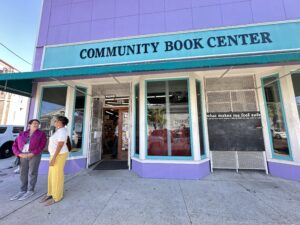

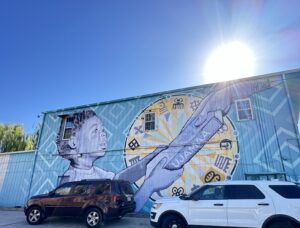
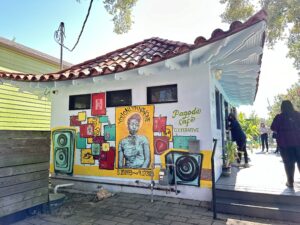
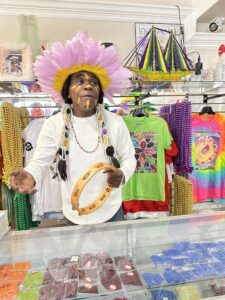

Takeaways:
© 2022 National Association of Development Organizations (NADO) and the NADO Research Foundation. All Rights Reserved.
Regional Development Researcher Andrew Coker joined the NADO team in March of 2023 after spending two and a half years as the Regional Economic Resiliency Coordinator at West Central Arkansas Planning and Development District. Andrew holds a bachelor’s degree from Hendrix College and a master’s degree from the University of Arkansas Clinton School of Public Service.
At NADO, Andrew conducts research on the newest economic and community development best practices from Economic Development Districts across the country. He helps produce easily digestible information on complex regional issues through case studies, tip sheets, and research reports. Andrew also hosts training and professional development opportunities including conference sessions and virtual webinars for member regional development organizations.
Andrew is one of our Missouri-based team members and enjoys reading and training for his next triathlon.
Jack Morgan came to the NADO team in 2022 after seven years with the National Association of Counties (NACo) as a Program and Senior Program Manager. Prior to NACo, Jack was a Policy Analyst for Friends of Southwest Virginia. Jack holds a bachelor’s in geography from Emory & Henry College and a master’s in geography from Appalachian State University.
As a NADO Senior Program Manager, Jack leads capacity-building and peer-learning work supporting energy communities in economic transition, regional resilience, and recreation economies. He also helps with the EDA-Austin training program Emerging Leaders.
Jack is certified by the American Institute of Certified Planners (AICP) and is a member of the American Planning Association (APA) in the Regional & Intergovernmental Planning division. He also serves on the Emory & Henry College Alumni Board.
Taking road trips, reading non-fiction, and indulging in top-notch barbecue and coffee round out Jack’s days. He loves maps, mountains, and of course, all things sports.
Karron Grant joined the NADO team in 2023 as Administrative Specialist and is the first face (or voice) you’ll see or hear when reaching out to NADO. As Administrative Specialist, Karron manages our database and coordinates NADO event operations. He ensures members’ needs are met, contact information stays current, and NADO’s office is running efficiently.
Karron came to NADO after four years in the classroom teaching at The New Century School and Old Mill Middle North where he received the Patriot of the Year award. He attended Towson University and the University of Maryland Global Campus and holds a bachelor’s in international studies and humanities.
Visiting art galleries and museums, playing basketball and bowling, and taking in movies and music are some of Karron’s interests and hobbies.
Deputy Executive Director Laurie Thompson has been with NADO for 25 years. Laurie helps keep the NADO and NADO Research Foundation wheels turning through management of the daily operations of the Research Foundation, securing financial resources and overseeing grants management, and helping execute NADO’s Annual Training Conference each year.
Laurie holds a bachelor’s in public affairs and government from Mount Vernon College and a master’s in health services administration from The George Washington University. Prior to NADO, Laurie spent time as a Field Specialist and an Eagle Staff Fund Director at First Nations Development Institute.
When she’s taking a rare reprieve from her NADO work, Laurie enjoys traveling domestically and internationally to visit friends and family.
Jamie McCormick joined the NADO team as a Policy Fellow first in 2019, then moved into her current role as Legislative Associate in 2021. As Legislative Associate, Jamie keeps NADO members apprised of any policy and regulatory issues and communicates NADO’s policy priorities to federal stakeholders and partner organizations. She is also the first stop for members with inquiries on policy issues. The planning and execution of NADO & DDAA’s annual Washington Conference is also managed by Jamie.
Jamie holds a dual bachelor’s in political science and international relations from The State University of New York College at Geneseo and a master’s in international development studies from The George Washington University. In addition to her roles at NADO, Jamie also worked as a Legislative Assistant for the Northeastern Retail Lumber Association.
Outside of her NADO work, Jamie is an active volunteer with the VOLO Kids Foundation and a fundraiser for YMCA youth programs. She is also NADO’s resident baker regularly providing treats for those in NADO’s D.C. office. Traveling, taking her pup on walks, and hiking in the northeast keep Jamie busy.
Brett Schwartz began at NADO in 2012 as a Research Fellow after earning his J.D. from the University of Baltimore School of Law. The following year, he was promoted to Program Manager and has now been leading as an Associate Director since 2018. Brett is responsible for managing NADO’s Economic Development District Community of Practice (EDD CoP), as well as researching and monitoring the latest trends in regional economic development and resilience, including best practices for the Comprehensive Economic Development Strategy (CEDS). With more than a decade of experience on the NADO team, Brett is a dynamic relationship builder helping connect and build capacity among the national network of regional development organizations.
Brett also holds a bachelor’s degree from Georgetown University and a master’s from Trinity College Dublin, as well as a certificate in mediation training. He’s a member of Catalyst Grantmakers of San Diego and Imperial Counties and was a participant in the 2021-22 Field Trips to the Future Cohort.
Brett is one of NADO’s West Coast team members residing in San Diego, CA where he enjoys spending time outdoors, attending concerts and festivals, and soaking up life as a parent of two young children.
Communications Manager Katie Allison joined the team in 2023 to lead the strategic communication efforts of NADO. Katie creates and develops print and online materials, communicates NADO’s updates to members via weekly emails, and maintains content for nado.org and NADO’s social media channels. She also works with different departments to generate new ideas and strategies to effectively describe and promote the important work NADO is doing for EDDs and RDOs across the country.
An experienced nonprofit communications professional, Katie has worked for organizations in western North Carolina for nearly a decade. She holds a bachelor’s in communications from Wingate University where she was a four-year student athlete. Katie has also completed Vision Henderson County, a comprehensive leadership development program that promotes informed and committed civic volunteerism.
Katie stays busy trying to keep up with her two young sons whom she enjoys exploring the Blue Ridge Mountains with. Traveling to new and favorite places and cheering on the Atlanta Braves are some of her family’s favorite pastimes.
Senior Program Manager Ciara Ristig has been a member of the NADO team since 2021, and helps with NADO’s EDD Community of Practice, EDD staff capacity building and other grants on a range of subjects, including equity and solar energy. Before NADO, Ciara worked as a Planner for the County of Santa Barbara and an Assistant Project Manager for REM Consult. Ciara holds a bachelor’s in urban studies and French from Bryn Mawr and a master’s in urban studies from Ecole d’Urbanisme de Paris.
When she’s not traveling, you can find her outrigger paddling and serving on the board of the Blue Sky Center in New Cuyama, CA, near her home base of Santa Barbara.
Carrie Kissel has been a member of the NADO team since 2005 when she began as a Research Fellow. She later moved into the roles of Program Manager in 2006, and then Associate Director in 2011. Carrie holds a bachelor’s in anthropology from Ball State University and a master’s in public anthropology from American University. As Associate Director, Carrie oversees NADO’s work in rural transportation and rural wealth creation. She provides technical assistance and support to rural regions on transportation and economic development issues and develops training and peer exchange events on transportation issues and rural wealth creation as an economic development strategy.
Carrie is a member of the Transportation Research Board (TRB) and secretary of TRB’s Rural Transportation Issues Coordinating Council. She is also a member of the American Anthropological Association and the National Association for the Practice of Anthropology.
Reading, gardening, hiking, and kayaking are a few of Carrie’s hobbies, and she organizes and facilitates a DEI/social justice-focused book club in her community.
Melissa Levy has worked at NADO as a Regional Development Researcher since February 2023 and is the Principal Consultant at her own firm specializing in wealth-based economic development consulting. With a career spanning nearly 30 years, Melissa brings a breadth of knowledge to her role as a Regional Development Researcher. Melissa provides in-depth research, coaching, and training on regional economic resilience, rural wealth creation strategies, and economic development.
Melissa is a North American Food Systems Network trained AgriCluster Resilience and Expansion (ACRE) facilitator and a WealthWorks coach, facilitator, and trainer. In addition to her professional work, Melissa serves on the Vermont Urban and Community Forestry Council, on the board of the Hinesburg Community Resource Center, and on the Hinesburg Economic Development Committee.
A true outdoorswoman, Melissa enjoys cross country and downhill skiing, paddleboarding, hiking, biking, and kayaking, as well as yoga, and teaching Tai Chi.
Program Manager Krishna Kunapareddy began her role with NADO in February of 2023 after 14 years of service at Boonslick Regional Planning Commission in Missouri. Krishna manages NADO Research Foundation’s Planning and Environmental Linkages and Center for Environmental Excellence projects. In addition to researching and writing, Krishna also conducts virtual workshops on innovative tools and techniques related to transportation planning.
She holds an undergraduate degree from Andhra University and a master’s from JNT University in India, as well as a master’s in city and regional planning from the University of Texas at Arlington. Krishna is also a certified Smart Cities Academy Practitioner and holds the Location Advantage certificate from geographic information system software company ESRI.
In her spare time, Krishna volunteers with Mentors4College helping high schoolers better plan for their post-high school paths. She is also a dedicated advocate for documented H4 Dreamers.
Krystal DeLeon joined the NADO team in October of 2020 as Database & Grants Manger, but in January of 2022 transitioned to her current role as Operations Manager. Krystal keeps NADO running through behind the scenes work of invoicing, solving any database issues that may arise, producing membership reports, and much more. Her organizational skills and thorough knowledge help the NADO team operate more efficiently across all departments.
Prior to NADO, Krystal was the Conference Services Coordinator for State Services Organization. She is a Certified Meeting Professional (CMP), a licensed realtor, and holds a bachelor’s in psychology from Liberty University. When she’s not keeping NADO’s operations in order, Krystal enjoys running and rock climbing, and adventuring with her husband and son.
Senior Program Manager Bret Allphin joined NADO in April of 2022 bringing with him a wealth of knowledge after a 20-year career with Buckeye Hills Regional Council in Marietta, Ohio. In addition to his bachelor’s in political science and master’s in public affairs, Bret is licensed Geographical Information Systems Professional (GISP). He is NADO’s go-to team member for all things mapping while also supporting members with transportation and economic development technical assistance services.
An avid sports aficionado and former collegiate athlete, Bret enjoys cheering on his Cincinnati Reds, hitting the trails on his mountain bike, and improving his golf game whenever possible. Bret is an involved community member in Marietta dedicating much of his spare time to serving on local nonprofit boards.

Applications cannot be saved and returned to at a later time. It is recommended you compile all of your information in advance in a word processor and cut and paste into the application below.
Joe McKinney serves as Executive Director of the National Association of Development Organizations (NADO). Headquartered in Washington DC, NADO provides advocacy, education, research, and training for the nation’s 500+ regional planning and development organizations.
Joe has thirty-one years of experience having served in city, county, regional, national association, and government management since 1991. He holds a bachelor’s degree in Public Policy Analysis from the University of North Carolina at Chapel Hill and is a candidate for a master’s degree in Public Administration from UNC-Chapel Hill.
McKinney has provided congressional testimony on numerous occasions regarding the importance of regional development organizations in helping shape the nation’s economic growth. He is nationally recognized for promoting innovative solutions in areas such as planning and economic development, workforce development, transportation and transit, and aging services.